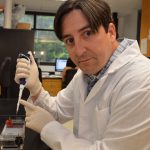Christopher J. Lessard, Ph.D.
Professor
Genes & Human Disease Research Program
Adjunct Associate Professor, Department of Pathology, University of Oklahoma Health Sciences Center
My 101
When the initial draft of the human genome was sequenced and released (2003) to researchers, many scientists thought it would immediately reveal the genetic basis for human disease. We soon realized that the human genome is much more complex than was ever imagined. Since then, technological advances have allowed us to evaluate thousands of genetic variants in large populations and conduct genome-wide association studies to identify which genes predispose a person to a particular disease or trait. More recently, we have entered a new era of affordable, rapid sequencing, which has provided scientists with unparalleled access to the high-quality, informative data needed to unravel the genetic relationships to human disease.
Not all diseases are created equal. Some diseases result from disruptions in a single gene, while others, including autoimmune diseases like lupus and Sjögren’s disease, are influenced by multiple genes. In autoimmunity, the immune system mistakenly recognizes self-molecules as foreign, leading to inflammatory processes and tissue damage to organs and worse prognosis if not treated. While the precise causes of autoimmune diseases are not fully known, it is well accepted that most arise from a complex interplay of multiple genetic risk factors and environmental triggers. Genetic studies in these diseases require international collaborations to assemble the large patient and healthy control populations needed to conduct large-scale genome-wide associations studies. To date researchers have identified more than ~200 genes in lupus. In contrast, only 22 genes have been identified in Sjögren’s syndrome. The disparity between Sjögren’s and lupus is largely due to the lack of large, well-characterized patient collections and the later age of disease onset.
My lab studies the genetics of autoimmune-related traits. Our goal is to understand the complex interactions between the elements of the human genome to identify new biomarkers and to develop therapeutics that will ultimately improve the lives of patients affected by these serious autoimmune disorders.
Research
My research centers on the use of genetic and other multi-omic data (publicly available and generated within the lab) to better understand the genomic mechanisms of disease risk in several related autoimmune conditions: Sjögren’s disease (SjD), systemic lupus erythematosus (SLE or lupus), neuromyelitis optica (NMO), and multiple sclerosis (MS). Most of these diseases have had several large genome-wide association studies (GWAS) including 10K-100K genotyped cases and surpassing >100 associated genetic regions. In contrast, the understanding of SjD genetic risk lags far behind due, in part, to the lack of an equally large GWAS. In 2022, we published the largest GWAS of SjD of European ancestry, which included 3700 genotyped cases and increased the total number of genome-wide significant (GWS) SjD risk loci from 12 to 22 (Khatri, et al. Nat Commun. 2022); seven of the previously established loci were identified in our 2013 publication (Lessard, et al. Nat Genet. 2013). This work was made possible through the Sjögren’s Genetics Network (SGENE), a collaborative network of >25 global institutions that I lead. Our efforts to expand the SGENE and increase the ancestral diversity of our genotyped population are ongoing with the goal to perform a GWAS with 10K SjD cases, thus bridging the gap between the genetic understanding of SjD and other related autoimmune diseases.
Most of the genetic variants that are statistically associated with increased disease risk by GWAS are positioned in noncoding regions of the genome and, if functional, alter the expression of specific genes through changes in the regulatory mechanisms that control transcription. In addition to performing the GWAS studies that identify regions of genetic association, my research aims to determine how specific genetic variants associated with Sjogren’s and lupus disrupt molecular mechanisms that contribute to disease risk. To do so, we perform deep bioinformatic analyses of multi-omic data, high throughput genotyping, short and long read sequencing, and molecular and cellular functional assays in disease-relevant in vitro cellular models. We are also leveraging bulk, single cell, and, most recently, spatial transcriptomics to improve our understanding of how functional noncoding genetic variants alter gene expression and downstream molecular mechanisms in specific cell types found in the heterogenous disease target tissues, salivary gland (Sjögren’s) and kidney (lupus). A significant amount of this work is supported by the Accelerating Medicines Partnership® Autoimmune and Immune-Mediated Diseases (AMP® AIM) program, which I joined as an investigator in 2022. While my research has primarily focused on understanding the genetics of Sjögren’s and lupus, the impact of our work expands to other related autoimmune diseases. Related autoimmune diseases, such as Sjögren’s and lupus, exhibit disease-specific and shared clinical, molecular, and genetic phenotypes. Uncovering the similarities and differences between the unique and common disease traits promises to improve our understanding of the genomic regulation that controls the human immune system in health and disease.
Brief CV
Education
B.Sc., University of Minnesota, Minneapolis, MN, 2000
Ph.D., Pathology, University of Oklahoma Health Sciences Center, Oklahoma City, OK, 2010
Postdoctoral Studies, Oklahoma Medical Research Foundation, 2012
Honors and Awards
Barrett Predoctoral Scholarship Fund Award, 2008-2009
Notable Poster Award, American College of Rheumatology Annual Scientific Meeting, San Francisco, CA, 2008
Paul Kimmelstiel Graduate Student Award for Excellence in Research and Presentation Skills, Department of Pathology, University of Oklahoma Health Sciences Center, 2009
American College of Rheumatology Research and Education Foundation/Abbott Health Professional Graduate Student Research Preceptorship Award, 2009
Paul Kimmelstiel Graduate Student Award for Excellence in Research and Presentation Skills, Department of Pathology, OUHSC, 2010
Graduate Student Association Award for Outstanding Academic Achievement, OUHSC, 2010
Outstanding Graduate Award (for a 4.0 GPA), OUHSC, 2010
Notable Poster Award, American College of Rheumatology Annual Scientific Meeting, Atlanta GA, 2010
OMRF Outstanding Paper Award, FY 2010-2011
Notable Translational Abstract, EULAR, Rome, Italy, 2015
J. Donald and Patricia Capra Award for Scientific Achievement, OMRF, 2015
European League Against Rheumatism (EULAR) E-Congress Basic Science Abstract Award, 2020
Arthritis & Rheumatology Outstanding (Top 5%) Reviewer, 2020
European League Against Rheumatism (EULAR) Congress Basic Science Abstract Award, 2022
Visiting Professor, Center for Autoimmune Disease Research (CREA), Universidad Del Rosario, Bogotá, Colombia, 2011 - present
Fred Jones Award for Scientific Achievement, OMRF, 2023
International Symposium for Sjögren’s Disease (ISSjD) Outstanding Abstract Award, 2024
Professional Membership
American Society of Human Genetics, 2007-present
American College of Rheumatology, 2016-present
American Academy of Neurology, 2015-2016
Joined OMRF scientific staff in 2007
Publications
Recent Publications
Beydon M, Dulin M, Ly B, Verstuyft C, Cardoso A, Juge PA, Dieudé P, Lessard CJ, Khatri B, Radziszewski M, Guern VL, Gottenberg JE, Seror R, Mariette X, Nocturne G. A genetic variant of BAFF is associated with the risk of lymphoma in Sjögren disease. Ann Rheum Dis, 2026 January, PMID: 41539891
Jupudi AA, Joachims ML, Lawrence C, Lopez-Davis C, Khatri B, Rasmussen A, Grundahl K, Scofield RH, James JA, Guthridge JM, Lessard CJ, Thompson LF, Farris AD. Identification of Sjögren's disease-associated T cell receptor motifs through deep sequencing. JCI Insight 10, 2025 December, PMID: 41424382
Radziszewski M, Tessneer KL, Lessard CJ. The power of genetics in decoding Sjögren's disease: current status and future development. Curr Opin Immunol 98:102690, 2025 November, PMID: 41218327, PMCID: PMC12626427
Selected Publications
Lessard, et al. Variants at multiple loci implicated in both innate and adaptive immune responses are associated with Sjögren's syndrome. Nat Genet. 2013 Nov;45(11):1284-92. doi: 10.1038/ng.2792. Epub 2013 Oct 6. PMCID: PMC3867192
Lessard, et al. Identification of a systemic lupus erythematosus risk locus spanning ATG16L2, FCHSD2 and P2RY2 in Koreans. Arthritis Rheumatol. 2016 May;68(5):1197-209. doi: 10.1002/art.39548. PMCID: PMC4981330. (#authors contributed equally).
Li, et al. Identification of a Sjögren's syndrome susceptibility locus at OAS1 that influences isoform switching, protein expression, and responsiveness to type I interferons. PLoS Genet. 2017 Jun 22;13(6): e1006820. doi: 10.1371/journal.pgen.1006820. eCollection 2017 Jun. PMID: 28640813. PMCID: PMC5501660.
Verstappen, et al. Gene expression profiling of epithelium-associated FcRL4+ B cells in primary Sjögren's syndrome reveals a pathogenic signature. J Autoimmun. 2020 May; 109:102439. doi: 10.1016/j.jaut.2020.102439. Epub 2020 Mar 19. PMID: 32201227. PMCID: PMC7337041. (*co-senior authors).
Khatri, et al. Genome-wide assocaition study identifies Sjögren’s risk loci with functional implications in immune and glandular cells. Nat Commun. 2022 Jan;13(1):4287. PMCID: PMC9329286.
Joachims, et al. Dysregulated long non-coding RNA (lncRNA) in Sjögren's disease impacts both interferon and adaptive immune responses. RMD Open. 2022 Nov;8(1):e002672. PMCID: PMC9717416
Contact
Genes & Human Disease Research Program, MS 67
Oklahoma Medical Research Foundation
825 N.E. 13th Street
Oklahoma City, OK 73104
Phone: (405) 271-2539
Fax: (405) 271-2578
E-mail: chris-lessard@omrf.org
For media inquiries, please contact OMRF’s Office of Public Affairs at news@omrf.org.
Lab Staff
Mandi Wiley, Ph.D.
Associate Staff Scientist
Bhuwan Khatri, Ph.D.
Lead Bioinformatics Scientist
Songyuan Yao, Ph.D.
Bioinformatics Postdoctoral Scientist
Cherilyn Pritchett Frazee
Manager of Laboratory
Valerio Coussa
Research Technician II
Marcin Radziszewski
Graduate Student
James Li
Graduate Student
Kiely Grundal
Senior Manager of Laboratory
Kandice Tessner, Ph.D.
Scientific Technical Writer
Shelby Thompson
Administrative Assistant III
Melanie Jones
Administrative Assistant II






















